|
Word Gems
exploring self-realization, sacred personhood, and full humanity
Editor's 1-Minute Essay:
Morality
return to "Morality" main-page
“What have I always believed? That on the whole, and by and large, if a man lived properly, not according to what any priests said, but according to what seemed decent and honest inside, then it would, at the end, more or less, turn out all right.” Terry Pratchett, Small Gods

definitions of morality
It seems that Cicero coined the term “morality,” or at least a Latin version of it, “moralis.” He did this in translating the Greek word “ethikos,” from which, we can see, derives our modern term “ethics," from the root "ethos," meaning "custom."
Custom speaks of local viewpoint, something you learn from the tribe. This is why Mary Wollstonecraft (see the main-page) referred to morality as “local manners.” Historically, each group created its own play-book.
This root idea of narrow parochialism emerges in another related word, “ethnic,” people living together as a nation, family, or caste. Particular shibboleths of a group create culture, an individualized paring and refining of environment. We discussed this in the article on "cultism."
Morality’s classical undercurrents of fluidity and flux, transient markers of each neighborhood, have given way, in our present world, to a sense of rigidity and fixed demarcation.
Today, generally speaking, morality signifies “conforming to rules of right conduct,” but this in an inflexible rubric -- as if we knew what is right and true, as if we knew for certain what ultimate good means for each person and in each situation.
the most important point I would have you know about the subject of morality
As we’ve seen, a general definition of morality might be “conforming to rules of right conduct.” But with this statement we approach very near the battlefield.
Who shall decide the legitimacy of these “rules”?
Who or what shall serve as basis of these “rules” dictating standards of morality? – stated plainly, as per the cartoon above, who or what shall tell the rest of us “who’s naughty or nice”?
the battle to define morality
An entire view of history might be crafted around the attempt to define morality. That entity which becomes invested with authority to legislate definitions of good and evil, to decide what is right and wrong, will have much power over people.
There are two major sources of authority – external and internal -- which might serve as basis, as constitution, for right conduct:
External basis for morality:
While governmental and corporate “father-figures” seek power in this area, by far the greatest “pretender to the throne” here is Big Religion. Much of the Word Gems site speaks to the activity of Dear Leaders who offer propaganda that you are not good enough, capable enough, to decide issues of morality; that God couldn’t love you enough, that you are essentially unworthy and pitiful, but for the services of self-appointed morality-definers.
|
they bought and sold you... controlled you...

While My Guitar Gently Weeps
I look at you and see the love there that's sleeping...
I don't know why nobody told you how to unfold your love
I don't know how someone controlled you
They bought and sold you...
|
The religious elite tends to speak much of “God’s law,” and of their own “infallible” authority, because, conveniently, it is they who will define these laws; but, not in your favor. See the articles on “cultism,” “fear,” “guilt,” “sin,” but especially these core writings:
Internal basis for morality:
As we mature and grow as individuals, we begin to perceive that our “made in the image” status as sons and daughters of God has provided us with all the wisdom we shall ever need in terms of deciding right and wrong. Our task is to discover and access the “true self,” that spark of divinity, long-dormant within the soul. As Jesus said, it will guide us into all truth.
Again, many of the Word Gems articles discuss these issues. You will want to study the writings on “spirituality,” “forgiveness,” the “true self,” “human potential,” “good” and “evil,” and “choice.”
several items to consider
Many years ago I wrote the following paragraphs for another article. I offer them here as examples of various aspects of the two major sources of morality-authority, external and internal.
an undisguised policy of self-interest masquerading as morality
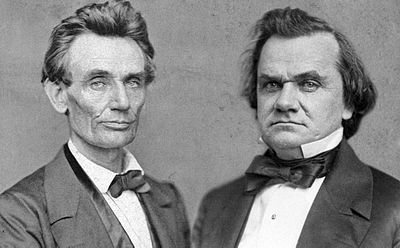
Lincoln and Douglas
Slavery in the nineteen century was justified by collective-ego institutions as "moral," part of the natural scheme of things.
See how Lincoln bludgeons the then-popular argument based upon "choice," which, although refurbished, is still used today.
Joseph Fornieri, The Lincoln Forum, Lincoln Revisited (2007): Fornieri, in this collection of Lincoln essays, helps us to understand the undergirding of Judge Douglas’s philosophical platform, the doctrine of “popular sovereignty,” which would allow new U.S. territories to extend or deny the institution of slavery.
This precept of self-determinism is “perfectly logical,” responded Lincoln, “if there is no difference between hogs and Negroes… [but the question is] whether a Negro is not or is a man. If he is not a man … he who is a man may, as a matter of self-government, do just as he pleases with him. But if the Negro is a man [shall he not] also govern himself? When the white man governs himself that is self-government; but when he governs himself, and also governs another man [without that other man’s consent], that is more than self-government – that is despotism.”
Lincoln went on to explain how the European so-called “Divine Right of Kings,” a "morality" of an earlier time, something from which we had only recently extricated ourselves, employed, in principle, this same notion of privileged and superior certain ones ruling over a lesser class of beings. All of this violated the “ancient faith,” a term by which Lincoln referred to the precepts of the Declaration of Independence, the moral foundation of the nation, in its statements that “all men are created equal.”
Editor's note: In other words, the very bedrock principle of this country finds basis not in some external and legislated definition of morality but in Jefferson's "self-evident" precepts of natural law; that law found in every heart which knows very well that it is wrong to treat another "unequally"; that is, in a manner which one would not choose for oneself.
“No man,” Lincoln asserted, “is good enough to govern another man, without that others' consent. I say this is the leading principle - the sheet anchor of American republicanism.”
Editor's note: These days we no longer know what a "sheet anchor" is. It was the largest of all anchors, one providing greatest stability. Suspicion of human nature, the need for checks-and-balances, the fear of power concentrated in the hands of the few, says Lincoln, is the sheet anchor, that great settling weight, which will not, must not, be denied in our debates of national policy. There are those in politics today, as there have always been, who will tell you that the sheet anchor of American Republicanism is an unnecessary heavy burden; that unicameralism would allow us to more efficiently address the public welfare; that the essence of the Constitution is obsolete and requires updating for modern times. These are the speeches of small minds or, worse, devious ones. As my mother would say, mark my words, these roosters strutting upon the national stage and crowing such do not have your interests at heart. "Modernizing the Constitution" is code-language for opening the floodgates of power to be concentrated in the hands of the few - their hands. And as they crow about "hope and change" and "trust us," they will strip you naked, rape you, and then cast you aside like a spent cartridge.
Douglas weakly responded with a claim that God had placed Adam and Eve in the garden and had told them to make their choice – exalting “choice” as a universal trump card. Lincoln bashed this sophistry with “God did not place good and evil before man, telling him to make his choice. On the contrary, he did tell him there was one tree, of the fruit of which, he should not eat, upon the pain of certain death.”
Fornieri, speaking even more plainly: “If taken to its logical conclusion, Douglas’s reading of the Bible would obliterate any firm basis for moral judgments by making them entirely relative to personal choice.”
Editor's note: We find here a counterfeit of the "internal authority." We are to make decisions founded upon the "true self" not the "false" with its empty praise of "personal choice."
Lincoln then goes further and eviscerates notions of choice and prattle of self-government as nothing more than an undisguised policy of “self-interest” masquerading as morality.
Lincoln began speaking of these issues with earnest in 1854, after the passage of the Kansas-Nebraska Act. His continued insightful commentary culminated in the famous Lincoln-Douglas debates of 1858. Judge Douglas won the Illinois senate seat that year – but Mr. Lincoln, his punch-and-jab speeches gaining the respect of some and the attention of all, found himself as a "dark horse" candidate, catapulted to the Presidency only two years later.
Editor's note: Notice the political double-talk here, explained both by Lincoln and Fornieri. A long time ago, the kings of Europe, and elsewhere, told us that they ruled by Divine Right; and, therefore, obeying them, in whatever they decreed, was the "moral" thing to do. But today, we of the modern age decry monarchism; instead, many ironically, still ruled by the dysfunctional ego, will install themselves, like the kings of old, upon a throne of despotism, and insist that whatever we "choose" is to be ordained as Divinely Right, merely because we have chosen it. The parallel is nearly perfect. Lincoln would respond, regarding both systems, that any such narrow, provincial, and self-serving notion of ethics or "morality," if it advocates either ruling over others, or depriving those others of inalienable rights, "without those others' consent," stands in opposition to "the sheet anchor of American republicanism"; to this I would only add, it stands in opposition to the ontological foundation of who we are as individuals, ones made "in the image"; and it is these who require freedom for their souls as bodies require air to breathe.
|
Editor's note:
the essence of ‘violence’ is ‘violation’ - not gross physical contact
To construe the definition of “violence” narrowly, limiting it to gross physical contact, would suggest that one’s right to defend oneself is also something immoral. And, of course, this is what some people believe – but this is absolute nonsense.
The word “violence,” itself, reveals its nature and underpinnings. “Violence” is part of the concept “to violate.” Those upon whom “violence” is inflicted have been “violated” in terms of human rights and sacred dignity.
And when defense is mustered to stop an attack of “violation” of human rights, this resistance is not “violence” because there is no “violation.” In fact, far from "violation," it is our duty to push back against evil. The form of this reaction becomes a matter of judgment and wisdom, but to allow evil and “violence,” the attacks of “violators,” to proceed unchallenged is grossly immoral.
There are many forms of “violence” which have nothing to do with gross physical contact. Your rights and dignity, as a human being, might be "violated" in numerous ways. But all of it is "violence."
One’s response to “violence” will, of course, be measured against the degree of “violation.” Some issues are small, mere slightings, and the response should be small; but some “violations” are egregious and life-threatening and, in such cases, all necessary force is an appropriate answer.
There are many “Hitlers” in life and in history, big and small, and when they come on the scene to "violate" you or the ones you love, you are well within your rights to resist, in some commensurate manner; and sometimes, if the "violation" threatens human life, then resistance might take the form of deadly force.
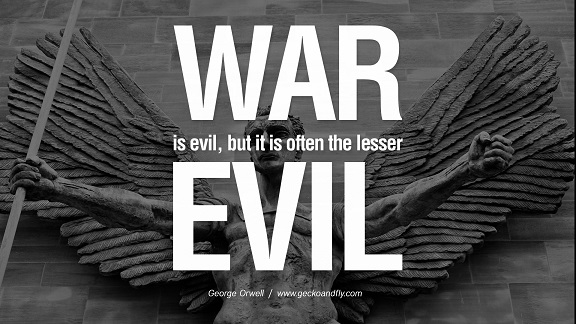
To do otherwise is to allow monsters to rule the Earth, as the "utterly shameless" will not stop gathering power to themselves until stopped. This is the lesson of history. These "violators" are run by the dysfunctional ego. The "Course In Miracles" explains this pathology to us.
Special note: In these few paragraphs, I have emphasized the morality, one’s right, of defending oneself as counter-balance to foolish people who say that self-defense is immoral. However, allow me to take back some of my polemic, not to side with radical pacifists but to appeal to a higher law. Some of the most famous, and possibly most misunderstood, phrases in the entire Bible are those of “turn the other cheek” and “resist not evil.” These statements by Jesus from the “sermon on the mount” have technical, very specific definitions, linked to particular antecedent accounts in the Old Testament. These terms have nothing to do with becoming doormat or sacrificial lamb to the world and its ego-insanity. All this acknowledged, however, Jesus meant to say that there are situations and times in life when the enlightened spiritual person will agree, with him or herself, to lay down personal rights to self-defense, will decide to suffer wrong and injustice, if such harmlessness serves the greater good. How to know when to “turn the other cheek” or to put up a fight? There’s no catechism or pat answer to help you with that, you’ll have to consult with God directly via the inner whisperings of your own sacred soul. See more discussion of “turn the other cheek” on the "Forgiveness" page.
|
|
more discussion on the morality of war
Somewhere on the WG site, there is the channeled account of a fallen Civil War soldier offering his altered viewpoint on patriotic duty. He said that, when the War began, he felt duty bound to leave family and farm to protect the Union. Later, in the afterlife, with a wider perspective, he changed his mind concerning the wisdom of what he did. He had great regrets.
As discussed, there is a time to go to war lest we all be overtaken, driven to extinction, by rapacious forces in the world - war is an evil, but often the lesser evil. However, as to when that proper time might occur is a matter of spiritual judgment.
There are a great many accounts, from a hundred years ago, of WWI soldiers communicating from Summerland. Very often, these young men are referred to as having “done their duty” to God and country, implying a rendering of service based upon their “goodness”. I’m not so sure about that.
In the “500 tape-recorded messages from the other side” writing we find direct-voice testimony of the very wise “ancient Chinese man” (who may have been Confucius or Lao-Tzu). He severely criticizes many coming to speak via the Flint mediumship. He says they are brazen, proud, full of themselves – and yet, he says, these arrogant ones are “good.”
He means to say that they are well intentioned. But they lack knowledge, talk when they should remain silent, and, in their delusions, believe, at least for the moment, that their checkered views represent the right path.
The commodity of “goodness” can be a much overrated virtue. It needs to be tempered with knowledge. Much of what a worldly mind might label as “goodness” is not nearly so good when closely inspected. There is no true goodness unless one is closely aligned with the energies of Universal Consciousness. See much discussion in the four “spirituality” articles.
Young men who march off to war may be doing a good thing if, indeed, home and hearth is being protected. But too often, so many, or most, wars are merely extensions of the political power-and-control schemes of a ruling class – but repackaged and sold as patriotic duty for “God and country” to unthinking young men (and, my, doesn't he look dapper in that smart uniform with the shiny buttons, marching so correctly to the beat of that drum). But, see Thoreau's unimpressed comment on this kind of mindless choreography as dubious goodness.
If a young man, due to ignorance and shallow view, believes himself to be “defending God and country,” then this good intention will be counted as ticket to enter Summerland. But, once there, he will be required to open his mind to clearer perspective. And if, at that point, he should reject the fact that he acted ill-advisedly, then he will plunge himself into a mental darkness and stagnation of spiritual growth. Suddenly, “defending God and country” will no longer be counted as “good” by his higher self.
|
greed is good

Editor's note: After reading this article, my friend Adrian added this: "John Kenneth Galbraith wrote an excellent book entitled The Culture of Contentment in which he describes the tendency to ascribe moral virtue to that which makes us comfortable. Greed is good! An unjust society, environmentally and socially destructive, is thereby perpetuated but with a moral underpinning which is mostly propaganda. It takes a lot of insight to penetrate the delusions of an imposed/induced morality." Gordon Gekko was right. Greed does build civilization -- but not without searing side-effects. Greed, with its concomitant, fear, represents a very low order on the ladder of human evolvement.
'every society inculcates a moral code, which redounds to the advantage of the group; every vice was once a virtue'
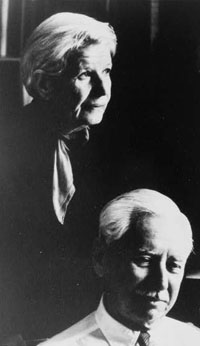
Ariel and Will Durant
Will and Ariel Durant, The Story of Civilization: "Part of the function of parentage is the transmission of a moral code. For the child is more animal than human; it has humanity thrust upon it day by day as it receives the moral and mental heritage of the race. Biologically it is badly equipped for civilization, since its instincts provide only for traditional and basic situations, and include impulses more adapted to the jungle than to the town.
"Every vice was once a virtue, necessary in the struggle for existence; it became a vice only when it survived the conditions that made it indispensable; a vice, therefore, is ... an atavistic throwback to ancient and superseded ways. It is one purpose of a moral code to adjust the unchanged - or slowly changing - impulses of human nature to the changing needs and circumstances of social life. Greed, acquisitiveness, dishonesty, cruelty and violence were for so many generations useful to animals and men...
"Every society inculcates a moral code, and builds up in the heart of the individual ... social dispositions that mitigate the natural war of life; it encourages - by calling them virtues - those qualities or habits in the individual which redounds to the advantage of the group, and discourages contrary qualities by calling them vices."
Editor's note: Historians Will and Ariel Durant spent a lifetime researching and writing the massive multi-volumed Story Of Civilization. Notice their findings concerning morality: "Every vice was once a virtue." The definition of morality has often changed over the centuries; even, changed within different cultures, depending on the needs of the group, the whims of ego-elites, and what they could get away with, plus the exigencies of the moment.
|
cherished notions of motherhood and apple-pie vary from culture to culture
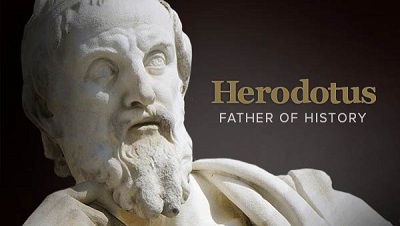
Herodotus (writing circa 450 BC), in his treatise on the Greco-Persian wars, comments on “nomos,” the Greek word for “custom, convention, or law.”
He talks about the arbitrariness of “nomos,” of how people become accustomed to what they know and what they’re taught in a particular culture, religion, or society.
Herodotus offers a disturbing and graphic example of the mutability of “nomos,” which I will refrain from detailing as it might turn your stomach. However, let’s call the custom in question “X.”
barbarity to one, the good life to another
In Greece, Herodotus says, a certain activity “X” is considered a barbarity, something, according to his sensibilities, beyond the pale of what any person of even modicum advancement would tolerate. But, he asserts, in another society of the Near East, “X” is considered a normative expression of “nomos,” indeed, a reasonable, even honored, course of action, with the refusal of “X” deemed to be an atrocity and appallingly distasteful.
who wrote the html-code for your programming, what you believe
The great “father of history,” Herodotus, is correct, of course. That which the average person believes is simply a product of what Grandma said, the Nice Young Man at Church said, what teacher in third grade said. These early pedagogues “wrote the html code,” our cultural programming, for what would become our personal sense of propriety, of right and wrong. In popular parlance, we refer to this burdening weight of prejudicial assumption as our “baggage,” which is not easy to set aside.
It’s not easy to set aside because the “little voice in the head,” the dysfunctional ego, wants to revel in a personal sense of “I’m right” with the rest of the world as “wrong.” In this kangaroo-court dialectic, the ego serves as early developmental “scaffolding” and “training wheels” for what will yet become a perfected autonomy, an awareness of sacred individualization.
As I mention these things, some will say, “Yes, ‘nomos’ might be an arbitrary flight of mere convention or custom for others, but I belong to the ‘one true church’ and I was taught the ‘one true doctrines,’ so in my case I really am right.” Well, that’s what everyone says, don’t they?
Do you want to know the truth? - no, really, do you? I don’t mean what Grandma said, dear heart that she was, because she was a human being, too, struggling toward the light as anyone else, and likely just as deluded as the rest of the world.
Do you want to know the truth? The process begins with great discomfort, great cognitive dissonance: you'll have to admit that you might be wrong - about everything.
Anything that you’ve not proven – which is probably almost everything you believe – you must put to the side. You must learn to doubt. You must examine, scrutinize, each tenet of belief, rigorously, carefully, to see if there’s evidence for its support. You must rebuild your mental life, your world paradigm, brick by brick, in this manner.
You must “open a channel,” allowing yourself to be taught. It’s not easy – rather, it’s so easy -- that most will not do this and will continue to live in a fairy-tale world of insubstantial “nomos,” the shifting sands of culturally-determined, society-approved good and evil.
Let's say it again: If you do embark on this journey of sifting through all of one’s closely held beliefs, you will find that the vast majority of what you currently hold to be "the truth" to be expressions of mere, arbitrary “nomos,” with no basis in hard-core reality.
We are headed for Summerland, as we’ve often discussed in these pages. Over there, people can continue with their privately defined visions of “nomos,” and they can live as they want to live over there; that is, until it doesn’t work for them anymore; until the sense of emptiness in one's life sends one to overwhelming malaise.
Existential crisis will yet come knocking on one’s door, and then, to preserve one’s sanity, one will be forced into the “mandated solitude and introspection.”
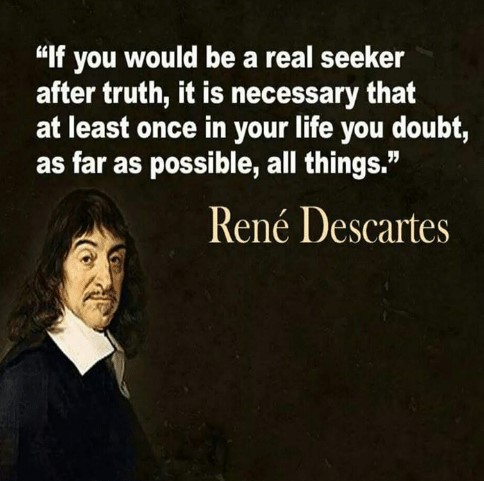
you can be conditioned to believe anything
Krishnamurti's lecture, Brockwood Park, England, Sept 14, 1969
"You know, there is a whole section, the Communists, who do not believe in spirit, not in a spirit, nor in a soul. The whole Asiatic world believes that there is a soul, that there is the Atman. You can be conditioned to believe anything. The Communist doesn't believe in God; the others believe in God because that is the way they have been brought up. The Hindus believe in a thousand different gods, conditioned by their own fears, their own demands and their own urges. Can one become aware of these conditionings - not only of the superficial conditionings but also of those deep down - and be free of them? If one is not free, one is a slave, always living in this rat race, and that we call living."
|
we are told that the Bible defines morality
The patriarchs Abraham and Jacob had their multiple wives and/or mistresses; so did Solomon, wives and escorts by the many hundreds. The handlers of the aged King David brought to him a naked girl to sleep with because he was feeling chilled. We could go on. These "Bible greats" are referred to as "father of the faithful"; "the wisest who ever lived"; "a man whose heart is just like God's"...
Editor's note: See my extensive article which discusses the following in detail.
While there is wisdom offered in the Bible, there is also much therein to appall and disgust any civilized and enlightened person; however, the award of most egregious bible-insult to humanity must go to this verse:
"Kill every male among the little ones, and kill every woman who has known a man intimately. But keep alive for yourself all the young girls who have not known a man intimately." (Numbers 31: 17, 18)
The invading Israeli troops were instructed - by God, they say - to kill most everyone, especially, the men, and their women with whom they slept; but they were to spare the choicest sexual objects, the trophies, for the conquering soldiers. Females who had not been deflowered were allowed to live, for a time, until cast away as spent melon-husks, having been devoured; especially prized were the young girls, young teens, middle-school girls, who had never slept with anyone.
This is the "morality" we find in vast sections of the Bible; the kind of morality that unthinking, unknowledgeable people - with cult-like fervor - will defend, because infallible Dear Leader has assured them every word in the Bible comes directly from God.
|
more than drinking the koolaid
The long reach of cultism encompasses much more than crackpot churches. The root idea of cult offers the sense of "cut." This core concept of "cut" leads us to images of refinement and refashioning and, by extension, development, control, pattern, order, and system.
Cultism as systemization finds a ready home in religion and philosophy which seek to regulate and redistill the patterning and ordering of ideas. However, in a larger sense, the spirit of cultism extends to every facet of society. We find it scheming and sedulously at work in politics, academia, family, corporations, entertainment, science, artistry – anywhere power might be gained by capturing credulous and fear-based minds.
See the “cultism” page for a full discussion.

|
the apostle Paul on morality: all things are lawful for me
The apostle Paul said this. He used this phrase more than once. What did he mean? Was he really saying, "Anything goes! Live life without thought of restraint or consequences!"
No, of course not. Paul was no libertine. But, the Nice Young Man at Church will never talk about this section of scripture. For all of his puffing about "every word of the Bible is from God," he will never mention this line from the great apostle.
Why? Paul is encouraging more personal freedom; more reliance on the spirit; more orientation toward one's internal guidance system; more personal responsibility... and much less dependence on religion.
The Nice Young Man is conflicted. While he will, at times, mention humanistic themes, he cannot go all the way as does Paul; to do so would undermine power-and-control over his flock. And it is not an exaggeration to say that if he were to speak as boldly as did Paul, he would likely lose his job. Dear Leader, his boss, would not be so impressed with such excessive romantic thoughts concerning personal freedom.
In any case, what is Paul really saying?
- "All things are lawful for me, but all things are not expedient; all things are lawful for me, but all things edify not."
He used these words in I Cor. 10: 23. The context was this:
There was a pagan temple in the city of Corinth, to which many people brought animals for sacrifice. To raise cash, the temple officials sold to the public some of this sacrificed meat. New Christians had a question: "Since this meat was used in a pagan ritual, maybe it's now spooked, maybe I should avoid it."
Attempting to diffuse this superstitious view, Paul tried to explain that meat is meat; and no priest's magic hand-sign will affect the meat (or anything else) in any way. Buy and eat in good conscience. Have a nice day.
Even so, some new Christians still worried about these things. Paul in this famous verse addresses the "mature" Christians: Do not trouble your immature brother or sister with contentious arguments and speeches. Do not make them feel to be less just because you understand a technical point about how things work. Do not eat your Big Mac in his face, that hamburger you bought down at the temple meat-market. Do not flaunt your freedom. Have some sensitivity, some tolerance.
- Paul, in effect, is saying, "Yes, of course, we (those of us with a bit of maturity) know that the meat handled by a pagan priest is just fine. It is perfectly ok for you to eat it... but not all things that you have a right to do are necessarily a good idea to do. Not all things that are legal to do will necessarily promote agape-love. Not all things that you, in good conscience, might allow yourself to do will build up (edify) your immature brother or sister."
All this is true. But notice something here. Paul makes his point in a grand and sweeping way. He could have merely said, "In this instance, you are free to do what you like." In other words, he could have construed the issue quite narrowly, without speaking to a larger general principle. He doesn't do that. Instead, he frames the issue in the most expansive possible way: "There are no external rules, there is no catechism, there is no guru Dear Leader, there is no written law that you have to consult. Commune with your own soul on the matter; and if your higher self approves, then, all things are lawful for you."
All good things are lawful for you -- and you, your higher self, will inform you what "good" means, and no one else.
Paul's writings at-large make clear this point. He has already written to the Galatians of "life in the Spirit"; about an internal guidance system, soul-energies linked to God, directing one to right course of conduct.
- Talk like this makes many people, including Dear Leaders, very nervous: The people will run wild without the external controls of legalistic religion! they say. No! says Paul. If you are living in the spirit, your very heart, your desires, will become different, and you will not want to do anything that might hurt you or anyone else; therefore, he can say with confidence, and no libertine attitude, “all things are lawful to you”.
This is the kind of freedom that we shall enjoy in the afterlife. The basis for this grand liberty is squarely built upon the philosophy of the apostle Paul – “all things are lawful to you.”
an unexpected consequence of Mr. Play-It-Safe’s morality
Many fearful-religious believe that the safest route to God's favor is to do nothing: thou shalt not is their favorite motto.
Jesus described, and warned about, this kind of mindless obedience, a fear-based acquiescence, in his parable concerning “the investment capital.”
A certain rich man gave amounts of investment capital to different managers in his employ. Before leaving on a trip, the rich man told his financial stewards to invest the money and make it grow. Many did very well as they risked capital and made profits.
But there was one manager who thought he would just "play it safe" and do nothing. Upon returning, the rich man was not pleased:
The servant given one thousand [dollars] said, "Master, I know you have high standards and hate careless ways, that you demand the best and make no allowances for error. I was afraid I might disappoint you, so I found a good hiding place and secured your money. Here it is, safe and sound, down to the last cent." The master was furious. "That's a terrible way to live! It's criminal to live cautiously like that! If you knew I was after the best, why did you do less than the least? The least you could have done would have been to invest the sum with the bankers, where at least I would have gotten a little interest. Take the thousand and give it to the one who risked the most. And get rid of [Mr.] 'Play-It-Safe' who won't go out on a limb. Throw him out into utter darkness." (Matt. 25: 24-30, The Message)
Editor's note: The reference to "utter darkness" is an allusion to the "detention centers" on the other side, where people are required to think about their lives. Do not panic. Anyone might leave these confines the very first day. See an extensive discussion here.
There's a section in Galatians where the apostle Paul speaks to the "fearful religious"; essentially, he says:
"What happened to your joy? This is not what I taught you! This is not how you began your spiritual lives! I know what happened to you! It's those Dear Leaders and their Nice Young Men at Church that got to you! They stole your joy as they made merchandise of you! They gained power and control over you by defining goodness and morality in a strange way. They told you 'life is all about rules' and that 'God really can't love you unless you keep the church rules.' How sad. Don't you know that God loved you even before you knew him? You began your life in God with joy, without a crushing burden of rules over your head, and do you think you will now impress God by some display of super-human willpower toward misguided notions of 'obedience'? How sad! What happened to your joy?"
alright then, I'll go to hell

From the pulpits of pre-Civil War America, black-robed men purporting to speak for God preached that slavery was "moral"; why even in the Genesis garden, they said, right from the beginning, we find one person enjoying superior standing relative to another. It's the natural order of things, they said. God made the world that way, and you wouldn't want to disobey God, now would you?
In Mark Twain's Huck Finn we see young Huck debating himself. Jim, the runaway slave, in the early hours of a very dark night, moans and sobs for his lost children. Blinded by a sudden light of realization, Huck admits to himself that Jim grieves his missing children just as any white person would! He had been taught by the holy men that men like Jim were not human, and could not feel sorrow, anymore than a beast would. Suddenly, Huck perceives the monstrosity of such assertion. He silently pledges to himself that he will not turn Jim in, even though Jim is "someone's else's property."
With a statement that might be seen as the pivot of the entire novel, Huck, unwilling to remain among the "fearful religious," resolves, "alright then, I'll go to hell!" He had been carefully taught by the holy men that to help a runaway slave was gross immorality - and part of Huck still believed this. In Huck's assertion of fortitude, we see a boy laying down his life for a friend, fully expecting to pay for his crime with the flames of hell.
By the way, claiming that our target of exploitation is "not human" is a tiresome old line of the dysfunctional ego. We used this self-deception when we exterminated many of the American Indians in order to take their land; we say this of the fetus when we crave the libertine lifestyle.
|
Cause and Effect: 'keep the law and you'll be blessed'
'My priest/minister/rabbi said that the universe is built on cause-and-effect, and that morality works the same way. He says that if I keep the church's rules, I can expect to be blessed; if I disobey, there will be a penalty from God. I guess this makes sense. Isn't cause-and-effect the way the universe really works?'
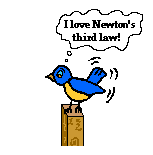
"Sowing and reaping" is a phrase the apostle Paul used in Galatians. It makes a lot of sense and good wisdom if you're a farmer. But if you try to expand this principle to include all the universe, you're going to fail.
Newton's Third Law of Motion forms the basis of the famous "cause and effect" dictum; however, it's the only point of physics that most preachers want to quote.
Newton's Laws apply within a limited frame of reference - they took us to the Moon and back. But we now understand that Newton's famous "laws" were but subset rubric within a larger system.
Newton's "laws" work well for "large" objects but quickly break down at the super-small atomic level; and even for larger objects as they approach a meaningful fraction of the speed of light.
The domain of the very small, the quantum world, with its "fields of probability," is spoken of by physicists as "the end of causality"; "the end of determinism"; that is, the end of cause-and-effect. But demagogic religionists, intent upon harnessing you with fears of God's judgment and self-serving views of "law," tend not to talk about current physics. "Cause and effect" has been dead for a hundred years, but you won't learn of this advancement from the pulpit.
Editor's note: see Dr. Sheldrake's discussion on how the universe's so-called "laws" are more like habits.
The deterministic "clockwork" universe of Newton has been rendered virtually obsolete. In the more pervasive, underlying, quantum world, certain inputs do not always yield predictable outputs. There is no universal cause-and-effect, only probabilities of likelihood -- mediated by elements once considered to be exclusive domain of the metaphysical and the spiritual: thought, consciousness, and intention.
Be careful what you accept as reality. Much of the world is not what it appears to be.
Editor's note: see the article "Stars And Midnight Blue" for further discussion on illusions in nature.
|
|
“My priest/minister quotes the scripture ‘It is more blessed to give than to receive’ whenever he wants us to contribute money to the church. It makes me feel guilty not to give money when he implies it’s God’s will for me to donate, something I ought to do.”
The verse, “It is more blessed to give than to receive,” from the apostle Paul in the book of Acts, means virtually the opposite of what your preacher suggests. His interpretation is outrageous and but thinly-veiled self-promotion.
READ MORE

|
‘thinking makes it so’
There is no action inherently good or evil. Only the intent of the heart will speak to goodness and true morality. It is as Hamlet said: "For there is nothing either good or bad, but thinking makes it so."
Father Robert Benson: "It is not what a man believes during his earthly life that counts: it is his actions and their motives upon which the great assessment takes place."
Let's speak of a very simple example. Consider the proverbial boy scout helping a little old lady cross a street.

Is this a good action? We are tempted to immediately say yes.
Certainly, the lady (assuming she desires to cross the street) is served by the scout; for her, the action is good.
But what about the boy?
If he is motivated by a spirit of service, of selflessness, then, yes, his action is "good"; however, if he is merely "playing to the crowd," or attempting to impress his girlfriend, or trying to prove how important he is, then, his actions are something less than "good."
Shakespeare is correct: "For there is nothing either good or bad, but thinking," that is, motive, "makes it so."
Let's not confuse helpful outcome with untoward motive, which latter adds darkness to one's spirit.
would you lie to the Nazi at the door
Our intentions rule in all situations, even in the most difficult of moral questions. There is a famous problem of ethics: Would you lie to the Nazi at the door?

You are hiding Jews in your home. If you lie when asked if you are harboring Jews, are you immoral when you speak this untruth? But, if you speak plainly, many people will die as a result of your "morality."
How would you answer this conundrum?
Some advise feigning madness or loss of hearing; or silently praying, expecting God to provide a miracle; or answering the soldier with another question; or making a joke out of his demand: "Yes, my house is full of Jews," whereupon you both laugh as he walks away.
But others say, are not some of these techniques forms of lying, as well? Some say that it would be ok to lie; that, to save lives, God would not mind.
Maybe you could forestall the question, divert attention, distract the unwary, create a disturbance; but, in the end, what will you do when you are forced to finally answer?
Some say that they would not answer at all. This is noble, but if you say nothing, the soldier will most likely become suspicious, search your house, and you'll all go to the ovens.
How would you answer this conundrum?
I've never been able to offer myself a totally satisfying answer to this question; however, I think the answer is this:
There is no one right answer. There is no single "good" and "moral" course. All of these options are "good" answers, if they issue from a heart that intends to do good. "For there is nothing either good or bad, but thinking makes it so."
All this acknowledged, personally, I would have a problem lying to the Nazi at the door. For one thing, I don't think I do well at acting. I don't think I could pull it off. But even if I could, I'm not so sure that I should lie to the Nazi at the door. It just doesn’t work for me. I’d have to find some other way.
Editor's note: This principle is featured in Proverbs. The KJV buries the sense of this in archaic language, but the phrase "witty inventions" (Prov. 8:12) speaks to "skillful and creative applications of altruism.”
However, if you in your heart-of-hearts are comfortable with lying to the Nazi, then, for you, it would be a "good" action; because your intentions would be good; you would not violate your conscience by lying.
Stated another way, all of the above possible actions might potentially be "good" and "moral" actions; just as each one might be an "immoral" choice, that is, for the one questioned, if the heart is insincere and deems an action to be "bad."
The intentions of the heart rule in all cases.
Heloise to Peter Abelard: "Wholly guilty, though I am [as the world judges me by its egocentric morality], I am also, as you know, wholly innocent. It is not the deed but the intention of the doer which makes the crime, and justice should weigh not what was done but the spirit in which it is done."
|
Lennie did alotta bad things, but he was never mean...
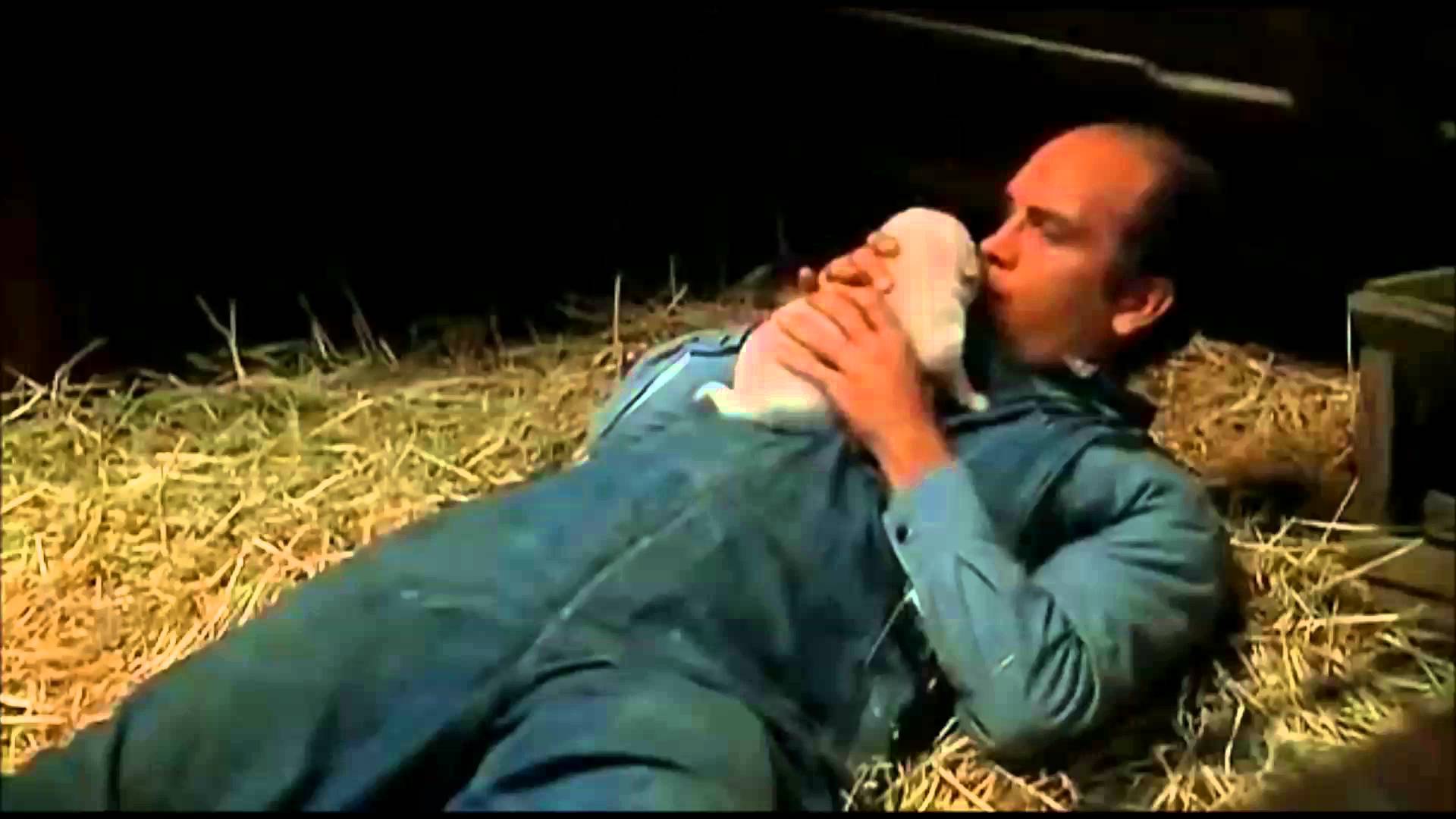
John Steinbeck's Lennie in Of Mice And Men has the mind of a 4 year-old, is pure-hearted, but he's gotten himself into some very bad trouble:
Lennie said, "Tell how it's gonna be" ... "We gonna get a little place," George began. He reached in his side pocket and brought out Carlson's Luger. "Go on," said Lennie. "How's it gonna be. We gonna get a little place." "We'll have a cow," said George. "An' we'll have maybe a pig an' chickens ... an' down the flat we'll have a ... little piece of alfalfa --" "For the rabbits," Lennie shouted. "For the rabbits," George repeated. "And I get to tend the rabbits." An' you get to tend the rabbits." Lennie giggled with happiness... "Gonna do it soon." "Me an' you." ... "Ever'body gonna be nice to you..."
With "shouted" we can viscerally feel Lennie's gushing excitement; his words, hopeful and innocent, here, in the context of the impending horrific, are among the most disturbing in all literature.
|

whole person or good person
Carl Jung: "I would rather be whole than good.”
Editor's note: If an infant baby girl eats and sleeps as to cause us little trouble, we call her a "good baby." Later, her mother tells her to "smile for the camera," "comb your hair," "brush your teeth” and “be a good little girl." During her teen years, a priest or minister will sternly instruct that "good girls don't” with "thou shalt not" as the safer way. And she may enter adult life attempting to be a "good wife," not only to please a husband, but also the expectations of family, friends, neighbors, church, and community.
What is the nature of this "goodness"? What did Carl Jung mean by, "I would rather be whole than good?" While it is true that we do not live merely unto ourselves, if we live too much for others, if we define ourselves primarily in terms of others' expectations, if we neglect our own growth and sense of personhood, we will not enter a better state of spirituality.
We cannot live and act according to someone else's script and become a whole person. We did not come to this world merely to be "good" and to do "good things." If that's the only reason, we might have had plenty of opportunity for it before coming here. We came here to expand our awareness, to move away from shallowness, to achieve a depth and richness of understanding regarding life and love -- we came here to “wake up” and become whole persons.
societal definitions of morality represent attempts to control life and death
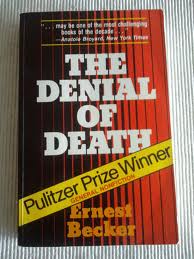
Dr. Ernest Becker's Denial Of Death ranks, for me, as one of the top-five most important books I've ever read. Here Becker speaks of group-imposed morality:
… the community won’t stand for the attempt by people to wholly individualize themselves… Society wants to be the one to decide how people are to transcend death; it will tolerate the causa sui [literally, "to make or engender oneself," a phrase of Spinoza] project only if it fits into the standard social project. Otherwise there is the alarm of ‘Anarchy!’ This is one of the reasons for bigotry and censorship of all kinds over personal morality: people fear that the standard morality will be undermined – another way of saying that they fear they will no longer be able to control life and death. A person is said to be ‘socialized’ [i.e., the "good little boy and girl"] precisely when he accepts to ‘sublimate’ [private wishes for society's demands.]
Now these euphemisms usually mean that he accepts to work on becoming the father of himself [causa sui] by abandoning his own project and by giving it over to ‘The Fathers’ [the Dear Leaders of society]... one submits to ‘social reality’: he can now deflate his own desires and claims and play it safe in the world [living under the protection] of the powerful elders… [in so doing] the only thing the person achieves is a practiced self-deceit – what we call the ‘mature’ character.
|
John is a good man...

"Richard is a good man... and you've been gone a long time."
In my travels, as I occasionally chat with elderly widows, I cannot help but notice, so often, even among those who miss their mates, that they speak of their husbands' virtues, not in terms of love and passion, but of mere utility: he was a steady provider, a good man, took care of his family, we always had enough; a good worker, never missed a day on the job; a dependable man, could always count on him. Such evaluation, while commendable, might be more expected from a corporate supervisor than a putative lover.
And, most tellingly, when, as appropriate, I tell them of the wonders of Summerland, that, one day, they might enjoy reunion with that lost husband, I am frequently met with lukewarm response -- and a desire to change the subject.
I have learned that when a woman -- especially, with some emphasis -- asserts, "My husband is a good man," she is offering code-language for, "I am not in love with him." Francesca and Della each praised her husband in the same kiss-of-death way. Yes, “the lady protesteth too much.”
"John is a good man," becomes an unconvincing argument Mary makes to herself, even on her wedding day. And "you've been gone a long time" does not mean "I don't love you" but, "it's gotten really complicated since you've been gone, and we need some time to work this out." And this is why Lois was so furious with him for leaving without a word of explanation.
|
malum in se vs malum prohibitum
In law school (a very long time ago) I learned the difference between these two ancient precepts, a foundation of what was once called “natural law.” The first Latin phrase literally means “bad in itself,” with the other, “bad because it’s prohibited."
The ancient Greeks and Romans understood that not all law, and therefore, not all morality, is eternally enshrined. Some actions are bad or intrinsically evil – like murder or rape or slander -- because of what we are on the inside as human beings. But other misdeeds represent mere local convention, just opinions of external-authority figures -- like speed limits or curfews or "infallible" church doctrines -- the contravention of which becomes "wrong” because somebody with power said so.
It’s important to know the difference. Those who stand to gain from your uncritical assent, and lack of information, will not hasten to enlighten you here.
|
Kant’s Categorical Imperative: morality is treating people as ‘ends’ not ‘means’; we’re not allowed to use others as stepping-stones or pawns to personal dreams of empire or pleasure

Kant (1724 - 1804)
Kant’s moral philosophy, in broad scope, aligns well with natural-law concepts which rule afterlife society. For example, we find Troubadour Spirit-Guide Margaret warning the typical John-and-Mary couple of the world against merchandizing, using each other, just to satisfy animal-instinctual cravings. While this is common in our world, it’s equally common, she said, for these marital-transgressors to spend time in a dark place on the other side making amends for this domestic Machiavellianism.
We’re not allowed, not even a little bit, to treat other human beings as means to some other end. To do so is absolutely immoral. “Means” refers to an action set in motion to effect some other goal, an “end.” In other words, all actions, to be moral, must acknowledge the sanctity and dignity of human life and potential.
Kant, reinforcing Spirit-Guide moralism, asserts that human beings hold a special place in God’s creation and must always be treated as ends in themselves. This is the “categorical imperative,” as Kant used the term.
Deontology describes Kant’s ethics – the term derives from a Greek word meaning “obligation or duty.” Deontological ethics is a morality based on rules and a requirement to observe them. Deontology, in principle, is similar to the word “religion,” which literally refers to “binding fast,” as in tying down something with ropes; that is, religion, etymologically speaks to “binding” in terms of duty or obligation. Religion and deontology share this common element of duty and obligation; however, they part ways in Kantian ethics in terms of basis and authority for obligation and duty. For Kant, and for afterlife natural-law ethics, the basis for right action is the “moral law” within, concerning which, like an inner cosmos, Kant said he stood in awe; the apostle Paul, too, spoke of the “law written on the heart”; Tolle would refer to this inner authority as “the true self.” Religion, on the other hand, typically derives its authority from external sources, “holy and infallible” books and gurus.
one of the best and surest tests of moral action
The “Categorical Imperative,” treating people as “ends” not “means,” and, in so doing, honoring the sanctity of human dignity -- people’s right and responsibility to determine their own destiny -- is one of the surest and safest tests in determining whether an action is moral or something else.
Final note: Kant also agreed that morality is to be defined in terms of motivation -- Shakespeare's "thinking makes it so" -- rather than good outcome (see the "boy scout" example above).
|
|
any thought or deed which does not promote a greater harmony and oneness must be viewed as immoral and evil
The natural state of ultimate reality, that level of consciousness inhabited by Mother-Father God, is characterized by harmony, oneness, order, and joy.
As consciousness, not matter, is the “ground of all being,” it is primarily our intentions, good intentions, and not necessarily our actions, which determine whether something is moral or non-evil. Unskillful application of good intention in one's heart, however, can make "the good" seem "bad."
Further, if a decision, supported by good intention, leads to greater harmony in the world, less disorder, a furthering of the greater good, then that decision is moral, non-evil. And even if the well-intentioned decision, in the short term, seems to create more trouble, it's still a moral, a "good," decision. Truly good plans or actions often take time to produce harvest, and it is the evil and immoral path which, typically, promises quick gains, free candy.
Editor's note: Unscrupulous politicians play this game all the time. They’ll try to buy votes by favoring one group over another, which is the essence of bad economics and bad government. When a “good” reformer comes along and takes away the free candy from a particular group, which has unjustly benefited at the expense of others, the reformer will be called “heartless,” “mean-spirited,” and the like. Sometimes “good” decisions force particular ones to live a responsible life, and the adjustment, with free candy now withdrawn, will be labeled as “bad” by the vote buyers.
Wisdom is required to see the difference between a "good" and "bad" decision or action. A little child might say, “The dentist is a bad man ‘cause he hurt me,” but the immature one suffers from myopia. Might we all at times? and might we prefer to misunderstand? As Upton Sinclair wrote: “It is difficult to get a man to understand something when his salary depends on his not understanding it.”
Good intention rules this issue. Stated another way, success in this area, a well-formulated morality, is not primarily about "doing" but "being."
|
Editor's note:
See Dr. Viktor Frankl's comments on "being" versus "doing," from his book, Man's Search for Meaning.
|
Our society is often dominated by left-brain intellectual pursuit, which is fine if viewed in its proper context, but the great insights into metaphysical issues, including morality, will come only by aligning ourselves with Universal Consciousness.
Editor's note: See a counterfeit version of "intention creates reality" here.
|
|
spectacular unkindnesses
A rich bachelor farmer, living alone as a bucolic Silas Marner, counting his acres in the night, my great uncle was known in the family for his spectacular unkindnesses.
He didn’t like religion, railed against it. However, on his deathbed, the Nice Young Man at Church, not unmindful of opportunity for largesse, scared dear uncle into signing over to the local parish a good portion of his estate.
a cosmic plea-bargaining
Uncle, no match for the fear-of-death and threats of judgment to come, decided to enter into a cosmic plea-bargaining dialogue with the Nice Young Man and lost not only his fortune in the process but any remaining semblance of sacred personhood.
Editor's note: This can be regained, but "the price is high," as my Dad used the phrase; it won't be easy -- "the last penny must be paid." Those who damage themselves the most in this world are not the sincerely-doubting atheist, but the narrow and fearful religionist. A "religious mindset" is something to overcome on the other side; no true progress can be made with rigid and dogmatic viewpoint, this caricature of "certainty."
last rites will actually make you worse, more fear-based, less autonomous as a person
The ironic thing about this kind of transaction is that you actually make yourself worse for your trouble. By caving at the end to terrors, you give your spirit over to more dysfunction, more servility, more co-dependency, more childishness, more darkness, more shirking of personal responsibility for one's life. Consequently, one’s inner essence, one’s “vibration,” as it’s called, becomes denser, heavier, that is, one’s “moral specific gravity” is weighed down even more; with the result that one enters an even darker realm on the other side. All this, courtesy of the Nice Young Man at Church, stoking the fear-and-guilt of what a fabled angry god might do.
The only sense of morality that counts, that will do you any good, is that which is born of sincerity. If you, in your honest and truest heart of hearts, believe that what you are doing is good and right and just, then, regarding your actions, you will not be defiling your conscience and spirit, even if you work for “Viking” Calcote. Though such believer would suffer delusion – maybe he or she knows only of the computer donation – he or she would not be in doubt.
the key to true morality, a sincere heart and spirit, the armor of one's own integrity
And that’s what’s key here, a sincere and wholehearted spirit offering protection from the inner corrosiveness of moral compromise. It's the invincible armor of one's own integrity. Why does it work this way? because our own divine soul will stand with us in guilelessness; as such, no power in the universe can defeat us.
Editor's note: Forgive me for a literary license. The "soul" is the "true self," is the real "me"; as such it cannot stand by us. More accurately, we access the "true" as opposed to the "false self" and begin to live authentically in an existential sense.
But, we so easily delude ourselves, make ourselves purchasable; in our venal ways, we so readily sell ourselves a story, so quickly do we bow to fear-and-guilt when true-believer assent promises to reward us; or, so we think, in our short-term views of morality, the "poisoned candy," which is another word for “evil.”
|
'being is doing', right action inevitably follows being
18.Mar.1956. Krishnamurti. Most of us are not concerned with bringing about the good mind. Action has become much more important than the quality of the mind. To me, action is secondary because when there is the good mind, then comes right action in a natural way; it is not 'doing is being', but 'being is doing'. Action inevitably follows being.
automatic morality
As I review the various facets of this issue of morality, certain aspects keep on coming up.
People concerned with ethics tend to ask the questions: What is proper conduct? What is right behavior? What is the moral thing to do?
And if we are religious, we might inject into this process a dark element of mental rigidity, fear, and even subtly blaming God for being unjust and harsh -- just as Jesus warned against (see above).
I think these questions are the wrong questions, the wrong focus. I think the "moral" and "good" choice will naturally, effortlessly, present itself to us if we center on something else.
Elizabeth Fry, testimony from the other side: This cultured and gentle English lady speaks via direct-voice medium: "There is, in a sense, organization here [on the other side]. There is a feeling that everything is in its place, but there is no conscious organization here… There are no actual leaders [here] as such – we have an organization which is so subtle and yet so natural – because, a person here does not ‘give orders’; we have groups of souls who do special work; but we all realize, automatically, within ourselves, what our part is, what work we have to do."
Notice Elizabeth's words as she speaks of "we all realize, automatically, within ourselves, what our part is, what work we have to do."
Elizabeth is a member of a service-team in the higher realms. How instructive for us to understand that no one there occupies the position of Dear Leader telling everyone else what good thing must be done. Instead, each person intuitively and "automatically" senses "within" him or herself what that moral and right action might be.
Here, I think, we have arrived at the bedrock of the nature of true morality. Evolved persons in Summerland do not walk around worrying about "what is the moral thing to do?" or "what is the rule I must obey?" or "what would Dear Leader have me do?" or "will God be displeased with me if I decide this as opposed to that?"
All of these are the wrong questions and the wrong mind-set. The right course for ourselves will naturally present itself when we live life from the "true self."
For advice on how to access this inner guidance, you'll want to consult these books:
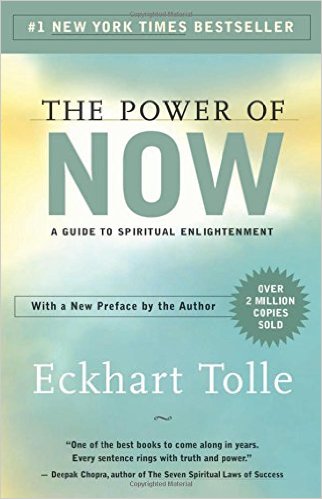 |
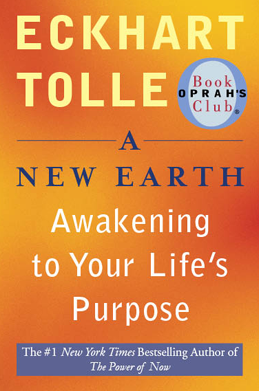 |
|
Editor's note:
This subject worries people. “We can’t trust the inner guidance," they say. "It’s better to have rules written in stone.”
This almost sounds reasonable until we put any “infallible rule” to a test. Life is not so formulaic, so predictable, as to warrant a one-size-fits-all legislation.
But I know what you're saying: "Some things are always wrong." Well, maybe some things are always wrong, but they're always wrong not because some Dear Leader said so, or because it's written in some so-called holy book, or because it was dropped from heaven or brought down from a so-called holy mountain.
Editor's note: There's no such thing as a holy book or a holy mountain. These are strange and fabled concepts without basis in reality. The Dear Leaders who promote this mythology are the first to deny your own holiness as "made in the image" with their anti-humanistic doctrines making you out to be a first-class unholy schlepp.
But, to argue the other side, we can always devise some hypothetical situation wherein the “greater good,” or even individual freedom or desire, demands an exception; at least, that's what we say. Some of these "loopholes" might have merit, but most of them are disingenuously crafted. We make exceptions for gross immorality all the time, whenever dysfunctional egos really want something -- in war, emergencies, and the exigencies of the moment. Suddenly, “thou shalt not kill” is no longer valid; "thou shalt not lie" loses its authority when your political party is advanced by "fake news"; and, most horrifically and disgustingly, we kill babies by the tens of thousands each year under the filthy banner of “choice.” All this, as Lincoln warned, is but "undisguised policy of self-interest masquerading as morality."
And to those who preach that "the people will run wild without the law," I will tell you this absolutely: The “inner guidance,” the “true self,” is no patsy or pushover. If anyone thinks you can just give it a song-and-dance and get your way to do whatever you like, then I will just say that you have not yet met the energies of the “true self.” It has a standard of morality utterly inflexible on natural-law issues, demanding strict justice, with no slack cut for you.
And regarding this "patsy or pushover" -- well, to those who think they'll generously, with a wink, cut themselves a deal, we should understand that we, ourselves, write our own judgment-ticket and dispatch ourselves to dimensional-ports unknown; that's how inflexible each of us is when it comes to making sure our "books balance." We just have no sense of humor about it. Most of you don't understand what I just explained. Another name for it is "pay the last penny" principle.
Every "penny" has to be accounted for in the financial statements. And when we cross over, there will be no bargaining for "dispensation" or other religious get-out-of-jail-free nonsense; those days will be over. This is what Jesus meant when he spoke of one's liability to pay “the last penny” for every malum in se infraction.
|
|
what is the best chess move in all the world
“The meaning of life differs from man to man, from day to day and from hour to hour... To put the question [of the meaning of life] in general terms would be comparable to the question posed to the chess champion: "Tell me, master, what is the best move in the world?" There is simply no such thing as the best or even a good move apart from a particular situation in a game and the particular personality of one's opponent. The same holds for human existence. One should not search for an abstract meaning of life. Everyone has his own specific vocation or mission in life to carry out a concrete assignment which demands fulfillment... the question of the meaning of life may actually be reversed. Ultimately, man should not ask what the meaning of his life is, but rather he must recognize that it is he who is asked.” Viktor E. Frankl, Man's Search for Meaning
Editor’s note: “Tell me, master, what is the best ‘good deed,’ the highest form of service, the most glorious example of sainted morality in all the world?”
There is no such thing. As per Dr. Frankl, there is no such thing as a best deed or most praiseworthy action or highest merit-badge of morality apart from some particular situation, some particular person with particular needs.
|
|
Editor's note:
David Hume (1711 – 1776) suggested that our sense of morality would be different if we were geese; that, “morality is in our gut,” as Dr. Daniel Robertson put it.
What we consider to be desirable is constitutive of being. A goose’s definition of the good will be different than our own
There are some who say that highest pleasure can be attained as a solo act, as an individual, simply by “going within.” It’s a start, but I think such statement falls short and is misguided.
Human beings, designed female and male, moreover, as “made in the image,” will be constitutionally directed to define bliss in a particular way; for them, ultimate happiness can mean only one thing.

|
|
Editor's last word:
As we’ve discussed (here and here), only Consciousness is real, with all manifestations of form as derivative of the main. With this in view, we might define the moral and spiritual person as one having aligned him or herself with Universal Consciousness.
The ancient Spirit-Guide Abu informs us that we came to this world in an undifferentiated state in terms of personhood. We came here to “wake up,” to open our eyes, to become a person in a functional sense, all of which is to grow in consciousness.
While our time on planet Earth is a kind of kindergarten for initial awareness, in a larger sense, our primary purpose will remain the same, no matter how advanced or ancient we become. If Universal Consciousness, and our alignment with it, is the only thing that’s real, then a million years from now our primary aim will continue as one of drawing closer to the Universal Mind, Universal Spirit, Universal Intelligence.
With this grand purpose in view, we can offer definition of the moral and spiritual person as one having attained a good degree of attunement with Universal Consciousness. A thought or action is “moral” if it furthers this cosmic process of at-one-ment; and, one is a “spiritual” or a “good” person if one’s life and essence are in line with God’s mind, Universal Consciousness.
|
|





















